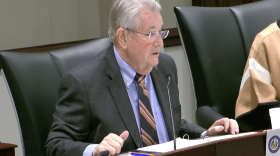-
147K able-bodied, childless adults would be required to work or lose their health care benefits under Senate proposal.
-
A federal judge ruled this week that Florida violated the constitutional rights of hundreds of thousands of people it had removed from the Medicaid rolls following the end of the COVID-19 public health emergency, when it sent beneficiaries “vague, confusing and often incorrect and misleading” termination letters.
-
In a class-action lawsuit, the judge barred the state from terminating benefits of people for financial-eligibility reasons unless it provides "adequate notice."
-
House Speaker Daniel Perez on Tuesday rolled out a far-reaching proposal to cut Medicaid and a low-cost state children’s health insurance program while tightening work requirements for people who rely on the state’s food-assistance program.
-
Democrats are seeking to roll back around $1 trillion in Medicaid cuts and extend enhanced Affordable Care Act subsidies that are set to expire.
-
From the looming Medicaid cuts to the expiration of enhanced premium tax credits for Affordable Care Act plans, big changes are on the horizon for health care in the Sunshine State.
-
In a statement Thursday, the group Florida Decides Healthcare cited a new state law restricting the process to get constitutional amendments before voters.
-
New U.S. Census data show Florida children are becoming more uninsured. Many lost their insurance and still need it for chronic illnesses.
-
Cuts to Medicaid and the Affordable Healthcare Act are coming next year. A grassroots movement is attempting to lessen the blow by petitioning for an expansion of Medicaid on the 2026 voter ballot.
-
Attorneys for the plaintiffs said in a motion filed Tuesday in federal court that the revisions won't affect the underlying issues in the lawsuit
-
As the U.S. House of Representatives debates President Donald Trump’s “Big, Beautiful Bill Act,” a coalition of faith-based groups in Florida are making a last-minute plea to the state’s Republican-dominated congressional delegation to vote against it because of the deep proposed federal funding cuts to Medicaid and the Supplemental Nutrition Assistance Program.
-
U.S. Sen. Rick Scott of Florida criticized New York’s Medicaid program, saying it gets far more from the federal government than his home state and needs to stop covering undocumented immigrants and adults without chronic illness.
Play Live Radio
Next Up:
0:00
0:00
Available On Air Stations











